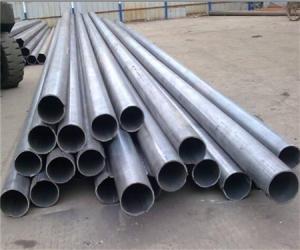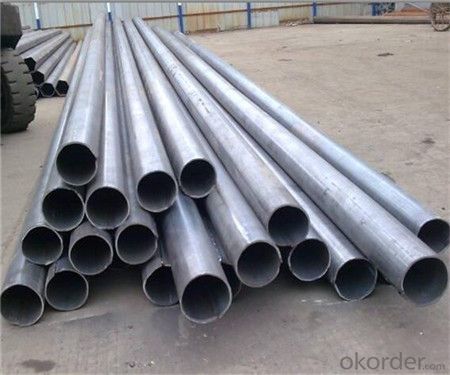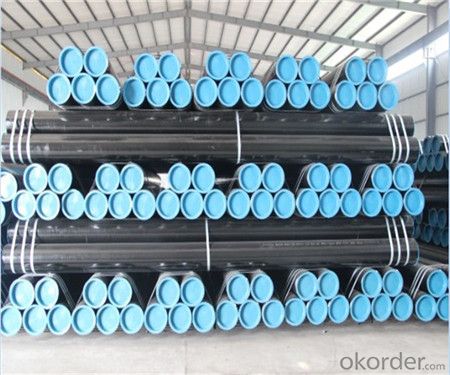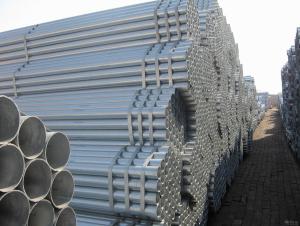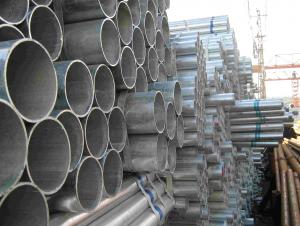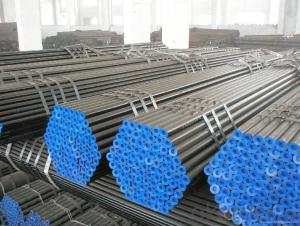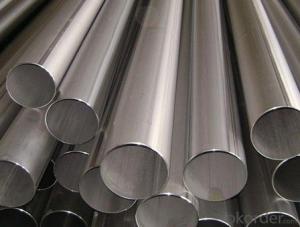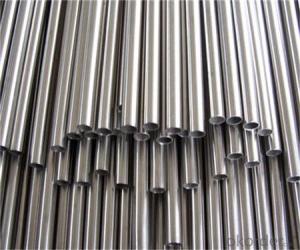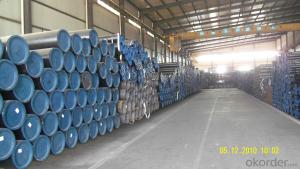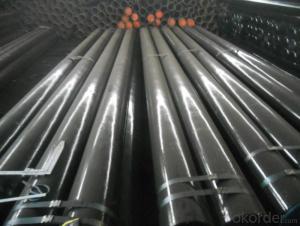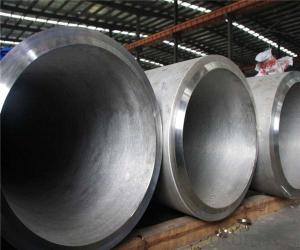Seamless Steel Pipeline API 5L-0685 Made in China from CNBM
- Loading Port:
- China Main Port
- Payment Terms:
- TT or LC
- Min Order Qty:
- -
- Supply Capability:
- -
OKorder Service Pledge
OKorder Financial Service
You Might Also Like
1、Structure of API 5L-0685 Seamless Steel Pipeline Made in China from CNBM:
Seamless pipe is formed by drawing a solid billet over a piercing rod to create the hollow shell. As the manufacturing process does not include any welding, seamless pipes are perceived to be stronger and more reliable. Historically seamless pipe was regarded as withstanding pressure better than other types, and was often more easily available than welded pipe.
2、Main Features of API 5L-0685 Seamless Steel Pipeline Made in China from CNBM:
• High manufacturing accuracy
• High strength
• Small inertia resistance
• Strong heat dissipation ability
• Good visual effect
• Reasonable price
3、API 5L-0685 Seamless Steel Pipeline Made in China from CNBM Specification:
Standard | GB, DIN, ASTM ASTM A106-2006, ASTM A53-2007 |
Grade | 10#-45#, 16Mn 10#, 20#, 45#, 16Mn |
Thickness | 8 - 33 mm |
Section Shape | Round |
Outer Diameter | 133 - 219 mm |
Place of Origin | Shandong, China (Mainland) |
Secondary Or Not | Non-secondary |
Application | Hydraulic Pipe |
Technique | Cold Drawn |
Certification | API |
Surface Treatment | factory state or painted black |
Special Pipe | API Pipe |
Alloy Or Not | Non-alloy |
Length | 5-12M |
Outer Diameter | 21.3-610mm |
Grade | 20#, 45#, Q345, API J55, API K55, API L80, API N80, API P110, A53B |
Standard | ASME, ASTM |
1) Material:20#(ASTM A 106/A53 GRB.API5LGRB,GB),45#,16Mn,10#.
2) Specification range:OD:21.3-610mm,WT:6-70mm,length:6-12m or according to the requirement of clients.
3) Excutive standards:GB,ASME API5L.ASTM A 106/A53,Despite of the above standards,we can also supply seamless steel pipe with standard of DIN,JIS,and so on,and also develop new products according to the requirements of our clients!
4) Surface:black lacquered,varnish coating or galvanized.
5) Ends:Beveled or square cut,plastic capped,painted.
6) Packing:bundles wrapped with strong steel strip,seaworthy packing.
4、Packaging & Delivery
Packaging Details: | seaworthy package,bundles wrapped with strong steel strip |
Delivery Detail: | 15-30days after received 30%TT |
5、FAQ of API 5L-0685 Seamless Steel Pipeline Made in China from CNBM:
①How is the quality of your products?
Our products are manufactured strictly according to national and internaional standard, and we take a test
on every pipe before delivered out. If you want see our quality certifications and all kinds of testing report, please just ask us for it.
Guaranteed: If products’ quality don’t accord to discription as we give or the promise before you place order, we promise 100% refund.
②How about price?
Yes, we are factory and be able to give you lowest price below market one, and we have a policy that “ for saving time and absolutely honest business attitude, we quote as lowest as possible for any customer, and discount can be given according to quantity”,if you like bargain and factory price is not low enough as you think, just don’t waste your time.Please trust the quotation we would give you, it is professional one.
③Why should you chose us?
Chose happens because of quality, then price, We can give you both.Additionally, we can also offer professional products inquiry, products knowledge train(for agents), smooth goods delivery, exellent customer solution proposals.Our service formula: good quality+good price+good service=customer’s trust
SGS test is available, customer inspection before shipping is welcome, third party inspection is no problem.
6.Images
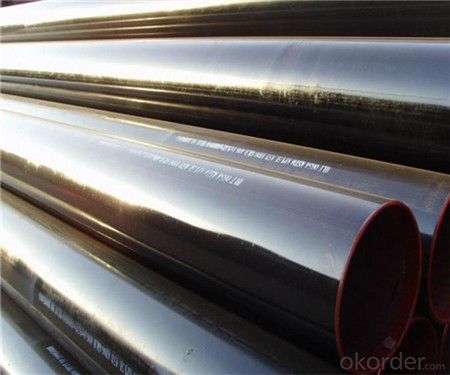
- Q: Can steel pipes be used for fire sprinkler systems?
- Yes, steel pipes can be used for fire sprinkler systems. Steel pipes are commonly used in fire sprinkler systems due to their durability, high heat resistance, and ability to withstand high water pressure. They are also cost-effective and widely available, making them a popular choice for such systems.
- Q: Are steel pipes suitable for use in coastal areas?
- Yes, steel pipes are suitable for use in coastal areas. Steel is highly resistant to corrosion and can withstand the harsh environmental conditions typically found in coastal regions, such as saltwater spray and high humidity. Additionally, steel pipes offer excellent structural strength, making them well-suited for various applications including marine construction, offshore oil and gas platforms, and coastal infrastructure projects.
- Q: How are steel pipes protected against lightning strikes?
- Steel pipes are typically protected against lightning strikes through the use of lightning rods and grounding systems. These measures help to divert the electrical energy from a lightning strike away from the steel pipes, preventing damage or potential accidents.
- Q: How are steel pipes used in the transportation industry?
- Steel pipes are used in the transportation industry for various purposes, including the construction of pipelines for transporting oil, gas, and other fluids. They are also used in the manufacturing of vehicles, such as cars, trucks, and trains, where they are commonly used for exhaust systems and structural components. Additionally, steel pipes are utilized in the construction of bridges, tunnels, and other infrastructure projects that support transportation networks.
- Q: Can steel pipes be used for conveying hazardous chemicals?
- Yes, steel pipes can be used for conveying hazardous chemicals. Steel pipes are known for their high strength and durability, making them suitable for handling various substances, including hazardous chemicals. They can withstand high pressure and temperature, ensuring the safe transportation of these chemicals. Additionally, steel pipes have excellent resistance to corrosion, which is crucial when dealing with corrosive and potentially dangerous substances. Moreover, steel pipes can be easily welded and connected, allowing for a secure and leak-proof transport system. However, it is important to consider the specific requirements of the chemicals being transported and ensure that the steel pipes are properly designed, coated, and maintained to prevent any potential risks or reactions with the hazardous substances.
- Q: How do steel pipes connect to other components?
- Steel pipes can be connected to other components using various methods, including welding, threading, flanges, and couplings. These connections ensure a secure and leak-proof joint between the steel pipe and other components, allowing for efficient fluid or gas transfer in various industries.
- Q: What is the maximum pressure that steel pipes can withstand?
- The maximum pressure that steel pipes can withstand depends on various factors such as the pipe's diameter, thickness, quality, and intended application. However, steel pipes are known for their high strength and durability, allowing them to withstand significant pressure.
- Q: How are steel pipes used in the construction industry?
- Steel pipes are widely used in the construction industry for various purposes such as structural support, conveying fluids and gases, and underground utility systems. They are commonly used in building frameworks, bridges, and high-rise structures due to their strength, durability, and resistance to extreme weather conditions. Additionally, steel pipes are utilized for plumbing and drainage systems, providing a safe and efficient way to transport water, sewage, and other fluids.
- Q: How are steel pipes used in the construction of water treatment plants?
- Steel pipes are widely used in the construction of water treatment plants due to their numerous advantages and suitability for this specific application. These pipes are utilized in various ways to ensure the efficient and reliable functioning of water treatment facilities. Firstly, steel pipes are commonly used in the transportation of water from its source to the treatment plant. They are highly durable and can withstand high pressure, ensuring the safe and secure delivery of water over long distances. Steel pipes are also resistant to corrosion, which is crucial in preventing contamination of the water supply. Within the treatment plant, steel pipes are used in the distribution system to transport water to different treatment processes. They are often laid underground or within the facility's infrastructure, ensuring a seamless flow of water between different treatment units. Steel pipes are known for their high strength and structural integrity, making them suitable for this purpose. Furthermore, steel pipes are used in the construction of various water treatment equipment. For instance, they are utilized in the construction of sedimentation tanks, where water is allowed to settle, and impurities are removed. Steel pipes are also used in the construction of filtration systems, where water passes through different layers of filters to remove contaminants. Another important application of steel pipes in water treatment plants is in the construction of pumping stations. These stations are responsible for maintaining the water flow throughout the treatment process. Steel pipes are employed in the design and construction of the pumping systems to ensure the efficient movement of water between different stages of treatment. In summary, steel pipes play a crucial role in the construction of water treatment plants. They are used for the transportation of water, distribution within the facility, construction of treatment equipment, and in the design of pumping stations. Their durability, resistance to corrosion, and high strength make them an ideal choice for this critical infrastructure.
- Q: How are steel pipes used in the construction of power transmission lines?
- Steel pipes are commonly used in the construction of power transmission lines due to their exceptional strength, durability, and versatility. These pipes serve various purposes throughout the project, contributing to the overall efficiency and reliability of the power transmission system. One primary application of steel pipes in power transmission line construction is for the installation of transmission towers. These pipes are used as structural components to support the transmission lines and maintain their alignment. The high strength of steel ensures that the towers can withstand the weight of the transmission lines, as well as external forces such as wind and ice loads. Moreover, steel pipes offer excellent resistance against corrosion, which is crucial for the longevity of the transmission tower structures. In addition to tower construction, steel pipes are also utilized for the underground transmission lines. These pipes act as conduits for the cables, protecting them from external elements and potential damage. Steel pipes are particularly advantageous in this application due to their ability to resist soil movement, withstand high pressure, and provide a secure pathway for the power cables. Furthermore, the durability of steel ensures the integrity and longevity of the underground transmission lines, reducing maintenance requirements and enhancing the overall reliability of the power transmission system. Furthermore, steel pipes are used for the construction of foundations and anchors for transmission towers. These pipes are driven deep into the ground to provide stability and support to the towers. The inherent strength and rigidity of steel pipes make them ideal for this purpose, as they can withstand the heavy loads and ensure the stability of the transmission towers even in adverse weather conditions. Overall, steel pipes play a crucial role in the construction of power transmission lines by providing structural support, protecting cables, and ensuring the overall reliability and efficiency of the transmission system. Their exceptional strength, durability, and resistance to corrosion make steel pipes an ideal choice for power transmission line construction projects.
Send your message to us
Seamless Steel Pipeline API 5L-0685 Made in China from CNBM
- Loading Port:
- China Main Port
- Payment Terms:
- TT or LC
- Min Order Qty:
- -
- Supply Capability:
- -
OKorder Service Pledge
OKorder Financial Service
Similar products
Hot products
Hot Searches
Related keywords
